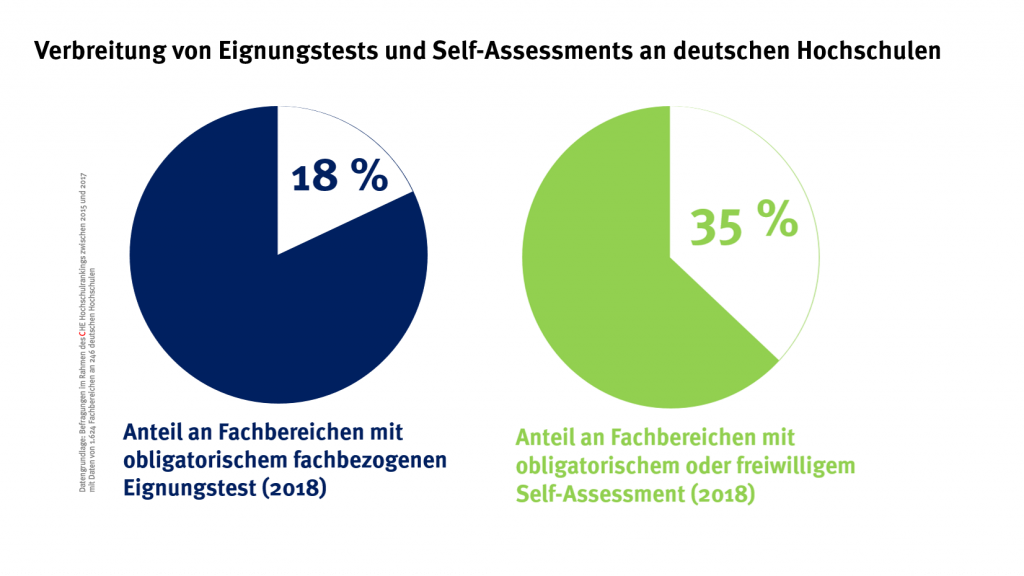
The topic of aptitude tests at higher education institutions is being discussed, not only in view of the possibility of Abitur examinations being cancelled due to the coronavirus crisis. Such admissions procedures are already standard practice at academies of art or music. An analysis conducted by the CHE Centre for Higher Education reveals the following for all other subjects: around one in five departments in Germany already use aptitude or selection tests for allocating places. One-third make use of the possibility of digital self-assessment by applicants. A new publication highlights the distribution of such test procedures in the allocation of places, as well as the associated advantages and disadvantages.
Access to higher education and a fairer selection procedure are a recurring topic of discussion in the education sector. As a result, for instance, new admission rules for medicine have been introduced this year. In Germany, the Abitur examination grade stills plays a key role in many selection procedures for places subject to restricted admission. In the light of the coronavirus crisis and the uncertainty as to whether regular Abitur examinations can be held, education experts are now debating the more extensive use of other assessment procedures, such as aptitude tests.
The CHE format CHECK on access to higher education in Germany shows that around 40 per cent of all Bachelor programmes are currently subject to restricted admission, resulting in the Abitur examination grade, among other things, being taken into account in the allocation of places.
Almost all academies of art and music use aptitude tests to determine applicants’ special aptitude for artistic disciplines. Sports degrees also involve applicants having to demonstrate their sporting aptitude in a special test. In such cases, it is a matter of determining whether or not the candidate has the aptitude.
In contrast, selection tests are used to award a limited number of places to the most appropriate applicants. The most well-known example is the Test for Medical Studies (TMS), which is now taken into account by virtually all faculties of medicine in the selection of applicants.
In all other subjects, however, the issue of testing plays a minor role. For example, only 18 per cent of all departments used obligatory selection or aptitude tests in the allocation of places, as shown by an analysis conducted by the CHE in 2018. Tests are used comparatively frequently in the areas of Architecture (45%), English/American Studies (35%), Business Administration (33 %) and Social Work (31%).
More than one-third (35%) of all departments already make use of a digital variant of the aptitude test – referred to as self-assessment. This involves prospective students using an online self-test to determine whether they meet the requirements for embarking on a degree programme in the subject of their choice. However, the self-assessment results are only disclosed to the would-be student – they are not part of the selection decision.


The CHECK also reveals regional differences in the use of self-assessment tests. Whereas almost half of the departments in Baden-Württemberg, for example, stated that they use their own obligatory or voluntary self-assessment tests, this was only the case in 4 per cent of the departments in Brandenburg.
Cort-Denis Hachmeister presented the pros and cons of using such tests: “On the one hand, aptitude tests facilitate a nationwide comparison of applicants’ knowledge and skills, as many have requested. On the other hand, well-designed aptitude tests are time and cost-intensive, meaning that their nationwide application in all subjects is unlikely to be feasible. What is more, such procedures only test a random fraction of a person’s knowledge and skills, in contrast to Abitur examination grades. They are therefore of no greater informative value than Abitur grades.”
Ultimately, both Abitur grades and a well-designed aptitude test will only have limited prediction accuracy of academic success, stated the expert on admission to higher education at the CHE Centre for Higher Education. He explained that academic success factors, including motivation, support by the higher education institution and, not least, financial aspects such as adequate funding for university education, are just too diverse.
For this reason, the author of the publication entitled “CHECK Hochschulzugang in Deutschland” (CHECK – access to higher education in Germany) calls for greater interplay between previous selection elements, encompassing Abitur examination grades, aptitude tests and consideration of practical experience, as is the case when applying to study medicine, for example. “An induction and orientation period that students must first ‘pass’ before being able to progress on their programmes could be an interesting approach for the future for German higher education institutions,” commented Cort-Denis Hachmeister.
About the publication
The CHE format CHECK, launched in 2019, provides a quick – primarily visual – overview of a variety of topics. The CHE compiled current data from a variety of sources to create an illustration on the topic of access to higher education. The information on aptitude tests and self-assessment, based on surveys conducted within the CHE University Ranking between 2015 and 2017, includes data from 1,624 departments at 246 higher education institutions in Germany. The data, first published in 2019 as part of the CHE publication “Orientierung und Unterstützung zum Studieneingang” (Orientation and support for university entrants), was re-analysed for this CHECK. Cort-Denis Hachmeister, Marc Hüsch and Jan Thiemann wrote the publication entitled “CHECK – Hochschulzugang in Deutschland” (CHECK – access to higher education in Germany). The entire visual content is available in graphic form in the CHE Flickr cloud: https://www.flickr.com/photos/156160353@N07/albums
The publication is available in German only:
